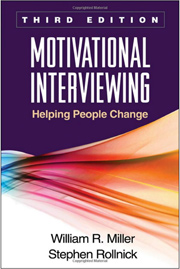BEN’S INTERVIEW WITH WILLIAM R. MILLER, PhD
 On May 24, 2013, we had an exciting Q&A Interview with William R. Miller, PhD, a founder of Motivational Interviewing, Emeritus Distinguished Professor of Psychology and Psychiatry at the University of New Mexico, and internationally known author of 50 books, including the newly released third edition of Motivational Interviewing: Helping People Change and Quantum Change: When Sudden Insight and Epiphanies Transform Ordinary Lives
On May 24, 2013, we had an exciting Q&A Interview with William R. Miller, PhD, a founder of Motivational Interviewing, Emeritus Distinguished Professor of Psychology and Psychiatry at the University of New Mexico, and internationally known author of 50 books, including the newly released third edition of Motivational Interviewing: Helping People Change and Quantum Change: When Sudden Insight and Epiphanies Transform Ordinary Lives
TO RECEIVE THE RECORDING, submit your name and email address here:


 ABOUT WILLIAM R. MILLER, PhD
ABOUT WILLIAM R. MILLER, PhD
